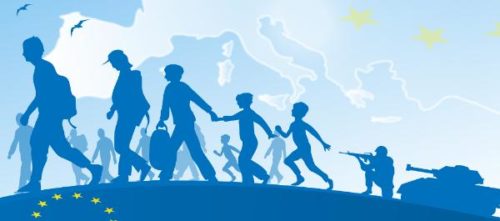Whose Line is it Anyway?
Migration Management in the European Union

Eurocrats of all kinds piled into the European Parliament’s hemicycle for the “High-level conference on migration management” on Wednesday afternoon. The speakers list was lengthy and the viewpoints diverse, to say the least. Despite being behind schedule and having many speeches needed to be cut short, the conference exposed an array of captivating opinions. In roundtable discussion, speakers covered everything from legality to integration to security. This all came, of course, with a healthy amount of finger-pointing and diplomatically worded jabs – yay, politics!
Like any EU event, there were plenty of the usual rehearsed speeches from the highest officials:
Jean-Claude Juncker, President of the European Commission made the classic joke about Luxembourgish not being widely spoken, and pulled his signature move of proceeding to give a speech in French, English, and German.
Antonio Tajani, President of the European Parliament made some general comments about migration and a necessity for more investment in Africa. Made multiple statements clearly meant to be quoted, such as “solidarity isn’t just about receiving; it’s about giving.” He was looking at you Poland, Hungary, and Czechia.
High Representative Federica Mogherini, master of the death stare, gave a few eloquent words on why everything just said is irrelevant, somehow all the while without sounding rude. Noted that migration management doesn’t have to be about airy talk of solidarity – sharing quotas is just the most logical option from a realist perspective. All member-states are already tied to Greece and Italy, so if they go down, you do too.
The theme that became apparent however, or at least that struck me most, was a lack of coordination among bodies tackling migration. Between NGOs speaking of barriers hit when trying to provide aid, to Italian MEP Borghezio accusing NGOs of aiding in human trafficking following the cases being investigated in his home nation, to local actors claiming they have felt abandoned by the EU; it was clear there was a concerning lack of mutual understanding amongst these varied bodies. It left me wondering:
Who should really be handling migration?
Mogherini stated in her speech that migration is best handled at the EU level, but it does not seem this is truly the case. I am partial to agreeing with her in that as a Union, the EU must work together on sharing the mass influxes of refugees. It is not sustainable, realistic, or fair to expect Greece and Italy to handle this crisis alone. However, I recognized from the words of the local level speakers, like the Mayor of Catania Enzo Bianco, that the direction needs to come from lowest levels first.
It is certain port cities after all being hit hardest by these waves of migrants. The places most affected need to set the agenda for what help they need and other actors should be acting accordingly. Similarly, there was a complaint expressed from Spanish Senator Jordi Marti Deulofeu that the “perverse centralized system” isn’t responding to Catalonia’s call for more refugees. That’s right, they want to be taking in even more. This is a call back to the EU’s foundation of subsidiarity. The EU, and even the national governments, should only be doing what cannot be done by the local governments; or in accordance with what the local government requests from them. But, this is much easier said than done.
“We felt alone – the EU did not understand” Enzo Bianco, Mayor of Catania
Having dialogues like these are pivotal to creating better understanding to the needs and obstacles of different actors. From this conference, however, it seems the biggest disconnect is the local level with the national and supranational level meant to be serving them. I believe this conference was a solid first step towards meaningful cooperation on migration management. However, to have more efficient progress, it appears the local level needs to be given more authority and input on migration and integration projects.
